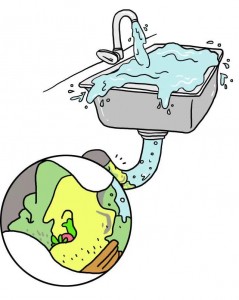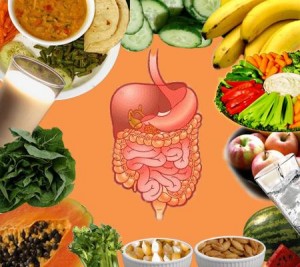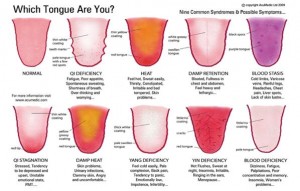An Analogy to Effective Weight Loss
Our digestive system is a tremendously important factor to our health and wellbeing, especially if we’re concerned with weight loss. Digestive problems affect a lot of other aspects of our lives which is why it’s so important to make sure that we do everything we can to assure that we have a strong stomach and well-maintained digestive system. When our stomach is healthy, it has the ability to transform food into valuable nutrients that our body can use and turn into energy. However, when our digestive body is weak or blocked, our body doesn’t receive all the nutrients it needs or even worse, it doesn’t properly eliminate the foods we consume which leads to long-term weight gain.
It’s often said that the human body is like a sink in terms of the principle of energy transfer: we have calories coming in and going out of your body. If your calorie intake is greater than what your body needs, you gain weight. So if this was true, losing weight would be easy; eating healthier foods with less calories than your body requires. For example, by not putting two teaspoons of olive oil in your salad, you reduce your calorie intake by 230 calories. Which means that if you were to do this for two weeks, you should be able to lose a pound. However, this is rarely true because the human body isn’t a mathematical formula that applies to everyone. A person’s weight is the overall result of physiological equilibrium. This is why 95.4% of the times we try to lose weight by calculating calorie intake ends up in vain.
People think that you can cut down on eating to lose weight, which isn’t necessarily true. When we start eating less, our body reduces it’s metabolic rate. When we’re dieting for an extended period of time, our body enters a starvation mode which causes it to accumulate fat whenever possible to keep in store for when it is not given enough food. Also, our muscles consume energy faster than fat. Muscle is an active tissue in the sense that it requires a certain amount of calories each day to maintain it. Thus, the more muscles you have, the more calories you burn. So, as your muscle mass drops, so does your daily calorie need. Let’s say that a dieter lost 10 pounds of muscle while on a diet and those 10 pounds had been burning 500 calories a day. Because the muscle tissue was lost, the dieter has to consume 500 less calories in a day to maintain the weight-loss. For this reason, our body sacrifices muscles and keeps fatty tissue during starvation periods. And post-diet, when we go back to consuming the amount of food our body needs to perform daily activities, our body can’t digest all the food because it’s used to getting smaller amounts and so all that extra energy is converted into fat and stored in our body, causing weight gain. Plus, when faced with a shortage of calories, your body’s natural response is to conserve fat. When this happens, we ultimately end up gaining all the weight back because the metabolism is slower and the calorie requirement is lower.

Our body has a set point for the rate of our metabolism. The set point is technically how much fatty tissue our body would store. The set point isn’t determined by the consumption of calories. Usually, skinny people have lower set points than those with slower metabolism. Our weight increases when the set point itself elevates. When there’s a high increase in the set point, it’s as when a sink is clogged. The sink here is like our digestive system. There are many common practices and habits in our society, such as drinking ice cold drinks, eating greasy food and eating late, that make us more prone to getting digestive system issues. Many people who have digestion issues don’t even realize that they have problems and they often think that experiencing bloating and gases every now and then isn’t a big deal but that is a sign of digestive system weakness. But simply because you don’t feel recurring stomach pain doesn’t mean that you have a healthy digestive system since there are different ways that an inherent digestive system will present itself such as a swollen tongue. Also, if people have thick tongue coating it also means that they have a poor digestion system. When a sink is properly functioning and not clogged, the water flow works well and fairly fast. The more water goes into the sink, the more water comes out of the sink. However, when the sink is clogged, a small increase in the water inflow would create an overflow situation.The pipe down the sink is like our digestive system; if our digestive system is comprised we aren’t able to efficiently transfer the food which causes blockage. People who eat a lot of dampness generating food(dairy, alcohol, greasy fatty food, etc) for a long period of time weakens their digestive system which causes a clogged sink.
In most cases, when a sink is clogged, we resort to different ways to try to limit or fix the situation. Certain people may choose to lessen their water usage or to use a bucket and scoop out the additional water. When we are consuming unhealthy fattening foods, our body is like a clogged sink and the hormones in our bodies reset the set point to a higher level. When we choose to reduce our calorie intake it’s as if we are rationing our water usage. Increasing exercise amount is the same as scooping water out of the overflowing sink. All those options are temporary solutions to a long-term problem. The best solution would, of course, be to fix the clogged sink. The best way to do that is by eating the right types of food, performing the right amount and type of exercises. Both these things promote not only a healthy digestive system but also energy and blood circulation in our body.
Our body is not a mathematical formula but rather a wide range of factors coming together which is why losing weight isn’t as simple as cutting down on calories or eating less but rather the types of food we eat and when we eat them.


Woaah ! thanks for sharing such a great content, keep up it.
I found it interesting when you said that a strong stomach can help our body prevent diseases from coming. I have a cousin who is planning to start her weight loss journey and asked if I have any idea what is the best option when choosing the formulas and plans. Thanks to this informative article, I’ll be sure to tell her that consulting a trusted supplement company can help her with her journey.
You made a good explanation that the best way to an effective weight loss is by consuming the proper kinds of food, conducting the proper amount and sort of exercises. It’s very helpful to me since I am planning to start a weight loss therapy program. I will make sure to look for a therapist that can apply that kind of approach.
[…] work in the body through an extremely complex system. Many people refer to weight and fat loss simply through the analogy of ‘calories in, […]